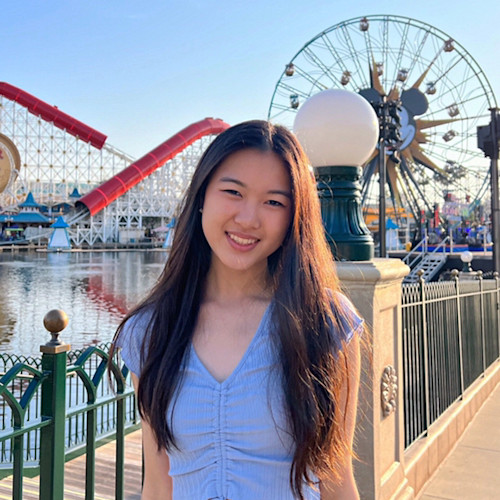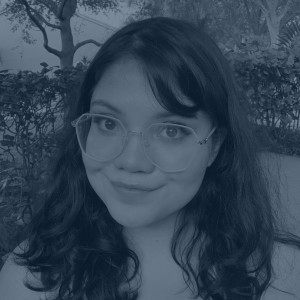Marina Lee, 18

Marina Lee has been coding since she was 11 years old. Her first coding experience came through a mentorship program with More Active Girls In Computing (MAGIC), where she was matched with a female mentor in the tech field. Learning Python from her mentor, getting to tour Google’s headquarters, and creating her first project inspired her to learn everything she could about programming. When she got to high school, she signed up for computer science and cybersecurity classes and spent her free time surfing YouTube for coding tutorials and taking online programming courses.
Marina was nervous when she registered for her first hackathon, AdaHacks 2019, but says the event being inclusive for female and non-binary hackers made her feel welcome. Marina enjoyed the workshops at the hackathon even more than her classes at school, and felt encouraged to learn about technology in creative ways. She continued to develop her skills as a hacker through the Kode With Klossy program and Girls Who Code, where she completed courses in web design and development. In 2022, Marina earned the Gold Award, the most prestigious award offered by the Girl Scouts for her project PocketStory. PocketStory is an educational game app designed for children with disabilities.
The summer before her junior year of high school, Marina participated in the AI4ALL summer camp, where she discovered that less than half of American high schools offer computer science courses and less than 15% of current AI researchers are women. Inspired by her own experiences in the hacker community, Marina decided to found Citro Tech, where she provides free tech education content and workshops to students around the world.
When she decided to organize her own hackathon, Citro Hacks, Marina realized she had never actually led a team before. But after stumbling upon the Major League Hacking (MLH) community during the COVID-19 lockdowns, Marina found the tools she needed to organize a successful event. She says, “without the community and other resources MLH provided, I wouldn’t have been able to host a successful hackathon.” Citro Hacks was a huge success, attracting 831 attendees from across the globe and raising over $3,000 in sponsorships. Marina says the most fulfilling part of hosting Citro Hacks was that 53% of the attendees were beginners and 99% of the attendees reported being more interested in careers in tech afterward. When one student personally messaged her on Discord thanking her for putting on the event, she was reminded that even though the hackathon was virtual, her impact had touched real people and made a difference.
Marina continues to dedicate herself to encouraging new students to pursue careers in technology. She was actively involved in her high school’s Society of Women Engineers club until graduation, helping to introduce middle school girls to engineering. Since starting classes at the University of California, Santa Cruz, Marina has served as a student intern and is now a board member of the Creative Tech Design club, where she has collaborated with others in designing and prototyping projects, creating case studies, and hosting workshops for other students. She remains passionate about equitable access to technology, and plans to pursue a career in software engineering or product design after graduation.
Quick Facts

Marina Lee, 18

Marina Lee has been coding since she was 11 years old. Her first coding experience came through a mentorship program with More Active Girls In Computing (MAGIC), where she was matched with a female mentor in the tech field. Learning Python from her mentor, getting to tour Google’s headquarters, and creating her first project inspired her to learn everything she could about programming. When she got to high school, she signed up for computer science and cybersecurity classes and spent her free time surfing YouTube for coding tutorials and taking online programming courses.
Marina was nervous when she registered for her first hackathon, AdaHacks 2019, but says the event being inclusive for female and non-binary hackers made her feel welcome. Marina enjoyed the workshops at the hackathon even more than her classes at school, and felt encouraged to learn about technology in creative ways. She continued to develop her skills as a hacker through the Kode With Klossy program and Girls Who Code, where she completed courses in web design and development. In 2022, Marina earned the Gold Award, the most prestigious award offered by the Girl Scouts for her project PocketStory. PocketStory is an educational game app designed for children with disabilities.
The summer before her junior year of high school, Marina participated in the AI4ALL summer camp, where she discovered that less than half of American high schools offer computer science courses and less than 15% of current AI researchers are women. Inspired by her own experiences in the hacker community, Marina decided to found Citro Tech, where she provides free tech education content and workshops to students around the world.
When she decided to organize her own hackathon, Citro Hacks, Marina realized she had never actually led a team before. But after stumbling upon the Major League Hacking (MLH) community during the COVID-19 lockdowns, Marina found the tools she needed to organize a successful event. She says, “without the community and other resources MLH provided, I wouldn’t have been able to host a successful hackathon.” Citro Hacks was a huge success, attracting 831 attendees from across the globe and raising over $3,000 in sponsorships. Marina says the most fulfilling part of hosting Citro Hacks was that 53% of the attendees were beginners and 99% of the attendees reported being more interested in careers in tech afterward. When one student personally messaged her on Discord thanking her for putting on the event, she was reminded that even though the hackathon was virtual, her impact had touched real people and made a difference.
Marina continues to dedicate herself to encouraging new students to pursue careers in technology. She was actively involved in her high school’s Society of Women Engineers club until graduation, helping to introduce middle school girls to engineering. Since starting classes at the University of California, Santa Cruz, Marina has served as a student intern and is now a board member of the Creative Tech Design club, where she has collaborated with others in designing and prototyping projects, creating case studies, and hosting workshops for other students. She remains passionate about equitable access to technology, and plans to pursue a career in software engineering or product design after graduation.
Quick Facts




